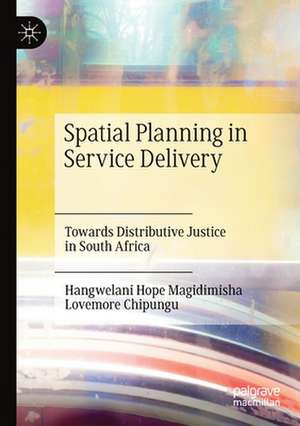Spatial Planning in Service Delivery: Towards Distributive Justice in South Africa
Autor Hangwelani Hope Magidimisha, Lovemore Chipunguen Limba Engleză Paperback – 15 aug 2020
| Toate formatele și edițiile | Preț | Express |
|---|---|---|
| Paperback (1) | 384.48 lei 6-8 săpt. | |
| Springer International Publishing – 15 aug 2020 | 384.48 lei 6-8 săpt. | |
| Hardback (1) | 395.85 lei 6-8 săpt. | |
| Springer International Publishing – 24 iul 2019 | 395.85 lei 6-8 săpt. |
Preț: 384.48 lei
Nou
Puncte Express: 577
Preț estimativ în valută:
73.57€ • 76.82$ • 60.75£
73.57€ • 76.82$ • 60.75£
Carte tipărită la comandă
Livrare economică 15-29 aprilie
Preluare comenzi: 021 569.72.76
Specificații
ISBN-13: 9783030198527
ISBN-10: 3030198529
Pagini: 248
Ilustrații: XXV, 248 p. 66 illus., 58 illus. in color.
Dimensiuni: 148 x 210 mm
Greutate: 0.33 kg
Ediția:1st ed. 2019
Editura: Springer International Publishing
Colecția Palgrave Macmillan
Locul publicării:Cham, Switzerland
ISBN-10: 3030198529
Pagini: 248
Ilustrații: XXV, 248 p. 66 illus., 58 illus. in color.
Dimensiuni: 148 x 210 mm
Greutate: 0.33 kg
Ediția:1st ed. 2019
Editura: Springer International Publishing
Colecția Palgrave Macmillan
Locul publicării:Cham, Switzerland
Cuprins
Part I: Creating the Stage for Interrogation.-Chapter 1: Spacial Inequality – An Introduction.- Chapter 2: South Africa in a Context.- Chapter 3: Hegemonic Global Influences on Service Delivery – A Theoretical Retreat.- Chapter 4: Methodological Considerations.- Chapter 5: Resilience in Service Delivery.- Part II: The Masquerade of a "Rainbow Nation".-Chapter 6: Exploring the Changing Context of Development in South Africa.- Chapter 7: The Development Ideology of South Africa as a Rainbow Nation.- Chapter 8: Re-living Socialism in a Neo-Liberal Dispensation.- Chapter 9: "We Have a Better Story to Tell.".- Chapter 10: The Spatial Implication of Service Generation.- Chapter 11: Citizen Participation in Planning: Balancing the Equation Between Equitable Involvement and Equitable Service Distribution.- Chapter 12: Addressing Quantitative and Qualitative Aspects of Service Delivery Through Spatial Planning.- Chapter 13: Reflections on Interactive Planning Decisions.
Notă biografică
Lovemore Chipungu, PhD, is Senior Lecturer in the School of the Built Environment and Development Studies at the University of KwaZulu-Natal. He has published widely in peer-reviewed journals and books, and his areas of interest are in housing policy, urban land and urban design.
Hangwelani Hope Magidimisha, PhD, is a renowned Senior Lecturer at the University of KwaZulu-Natal. As a practitioner, academic and researcher, she takes an interdisciplinary approach in her analysis of issues in the built environment with a focus on urban agriculture, migration, and spatial inequality.
Hangwelani Hope Magidimisha, PhD, is a renowned Senior Lecturer at the University of KwaZulu-Natal. As a practitioner, academic and researcher, she takes an interdisciplinary approach in her analysis of issues in the built environment with a focus on urban agriculture, migration, and spatial inequality.
Textul de pe ultima copertă
This volume presents a detailed synthesis of the historical, present-day and future state of service delivery in South Africa. The generation and distribution of services in any geographical space has been and is always a source of inequality in human society. Thus, in the context of spatial planning, space is the major factor through which distributive justice and sustainable development can be achieved. To examine the continuation of spatial inequality in service delivery, the authors employed both qualitative and quantitative research methods in a multi-pronged approach, utilizing empirical data from the Vembe District in Limpopo, data from the South African Index of Multiple Deprivation, and representative attitudinal data from the South African Social Attitudes Survey. Ultimately, this study examines spatial differences in living environments with a focus on the distribution of household services and discusses strategies to achieve spatial equality.
Caracteristici
Employs both quantitative and qualitative analysis in a consideration of the past, present, and future for a holistic perspective Questions South Africa's development ideology and whether it meets the mandates of its citizenry through participatory and collaborative means Shows how spatial planning can be used as a tool in the South African context to mitigate inequality
